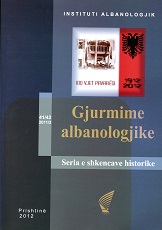ROLI I KOSOVËS NË SHPALLJEN E PAVARËSISË SË SHQIPËRISË DHE QËNDRIMI I SERBISË
THE ROLE OF KOSOVA IN ALBANIA’S DECLARATION OF INDEPENDENCE AND SERBIA’S POSITION
Author(s): Xheladin ShalaSubject(s): History
Published by: Instituti Albanologjik i Prishtinës
Keywords: ROLE OF KOSOVA ; ALBANIA’S DECLARATION OF INDEPENDENCE ; SERBIA’S POSITION
Summary/Abstract: There are undisputed facts that there were close links between movements and large Albanian uprisings, especially on those of the years 1908-1912, which should occupy a special place in our historiography, since they do enrich the national history. Without any doubt we claim that Kosovo Albanian population and its political elite were active in all movements and rebellions that sought liberation and unification of all Albanian territories, in order to form a national free state for our entire population. Kosovo attributes nobody can deny nor take. Thus, rightfully we ascertain that in the late 19th century Kosovo has been the bloodiest and most important land of the Albanian National Movement, which gave a decisive contribution to the well known movements and uprisings before and on the eve of the independence of Albania in Vlora on November 28, 1912. In fact, they will directly affect the decision on the deserved declaration of Albanian independence. However, Kosovo and other Albanian territories around it remained wrongfully outside of accepted Albanian borders, and that was the result of the combinations made by European Great Powers in the Conference of Ambassadors in London in 1913. However, it is known historically, geographically, ethnographically that Albanians who remained outside the London Conference decisions were, and are part of the Albanian people, once dispersed in the Congress of Berlin in 1878, and then forcedly and arbitrarily halved in 1913. Since the declaration of independence and formation of the Interim Government of Vlora, political and military leaders of Serbia began with various threats and blackmailing, interfering in internal affairs that had as objective further complication of the political situation and ruining of the new state in Balkans from the start. Indeed, Albania and Albanians in general, were in great distress from these monsters and reckless people of the Balkans, who were encouraged and assisted in every aspect by Russia. Therefore, the First Balkan War was de jure against the Ottoman Empire, but de facto was a war of extermination against the Albanian nation. It simply made an invasive war against real Albania causing for only few months more damages then Ottoman Empire made for several centuries. Realistically, anti- Albanian designers who were serving to the great Serbian policy boasted that in their political and diplomatic combinations in Balkans and broader have always tried to obstruct all rightful requests of Albanians to establish independent country, for the simple reason that this state according to them was being established against their, Serbian expansionist aims. Therefore, it should be noted that since the 1830 acquisition of autonomy and independence of Serbia in 1878, all Serbian governments in all relations with Albania and Albanians in general, have never had even the slightest sincerity.
Journal: Gjurmime Albanologjike - Seria e shkencave historike
- Issue Year: 2011
- Issue No: 41-42
- Page Range: 087-114
- Page Count: 28
- Language: Albanian
- Content File-PDF

